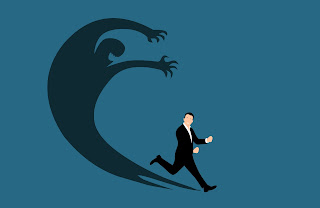In The Origin of Consciousness in the Breakdown of the Bicameral Mind, Jaynes gives his supposition that man, in early times and too in some situations today, was not 'conscious' which is to say, self-conscious. Decisions were made by the alpha of the group or tribe, which others followed without too much question. As communities widened and there came to be less contact with the leader of the group, this way of thinking gradually was lost; people had to make their own decisions. During this transition, people whose brains were not wired to particularly think for themselves beyond basic animal functions (hunt, eat, sleep, frolic, etc.) would occasionally get something in their heads which most people nowadays would recognize to be an "idea." In these simple societies such a thing wasn't common, and it was not immediately recognized to be one's own thought. Thus -- this command that has suddenly entered one's brain must have been a command from God. Reading the history of the Trojan war, which is among the earliest literary documents in the world, one finds that virtually everything the characters do is directed to them by gods (Aphrodite tells Paris to find Helen and Helen to go with Paris; Athena tells Pandarus to kill Menelaus; Hermes tells Priam to coax Achilles back to war -- no one just decided to do these things on their own, everyone was under direct orders from the divine.) Most early writings follow a similar way of describing the characters' behaviors, and that is much of the basis and backup for the theory.
These commands from the gods seem to come about under stress, and in a very simple and primitive society it appears that just having to make a decision was an unusual amount of stress for most people. Nowadays most folks brains are integrated, and we usually have levels of stress that keep us getting ideas constantly. This is, I suspect, part of why domination and other coercive work tends to be so much better regarded in simpler cultures: if a person is not used to getting his own ideas and making his own decisions in the way with which now we are familiar, some new command put in by a magician's magic might be enough to make you act it out readily. In most of the world people are accustomed to being discerning and are in the habit of freely choosing which ideas to follow or not (this, says Jaynes, developed as a survival method -- one who can choose to not act out every impulse is able to avoid angering others an thus is less likely to get themselves killed or in other trouble.)
But back to the topic of stress. Many spellcast traditions suggest or require actions like meditating or doing breathing exercises or something in that vein before working magic. Often you're told you must "let in no other thought" beside the spell's intent or something like that. The Master Key System -- a Law of Attraction book which is used by some root doctors as a manifestation guide -- directs that the user must learn to clear ALL thoughts in order to manifest desires. Jaynes notes how in cultures that appeared to be losing the bicameral mind, rituals were developed to try to provoke the gods to speak again -- usually boring repetitive tasks. These all have apparently the same function, however. They are to lull you back into that animal mindset which is needed if you're to work with gods.
Being that one cannot distinguish the difference between gods and ideas when under stress, it is therefore no wonder that spells tend to do poorly if the person casting them or wanting them cast is fretting. (I have heard this called "worrying to death" a spell.)
